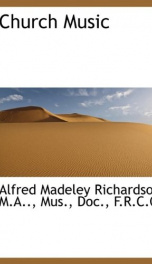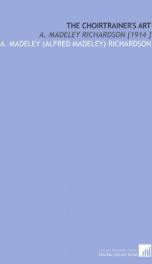church music

Purchase of this book includes free trial access to www.million-books.com where you can read more than a million books for free. This is an OCR edition with typos. Excerpt from book: commenced the period of development of the arts connected with worship. Constantine and his mother Helena erected magnificent churches, and into these were introduced choirs of trained singers. One of the results of this was the commencement of the controversy concerning congregational singing, which has lasted to our own days, and still shows no signs of abating. At the Council of Laodicea (circa A.d. 360) it was prescribed that only those duly appointed should sing in Christian Churches.1 39. We now come to a great name which stands out prominently in relation to early Church musicthat of St. Ambrose, Bishop of Milan (a.d. 374-397), with whom may be said to have commenced the period of ecclesiastical music, regarded as a regulated system. He collected and set in order certain scales upon which music should be based, naming them after the old Greek scales (though it is to be noted that they differed from these in all respects other than in name). These scales remained in use for several centuries, and from them was developed what is known as the Gregorian system. 40. St. Augustine on hearing the Milanese music was greatly affected. He writes : " Quan- i Canon 15: " irepl Tov Seiv irtov Tuv KavovucSiv j/arwv Twv tVi 7 oc unfiwiKi. iwajiaivnviutii Ku.i dm) 3ttpOt/c!.$ //a6muv crt'/raus vivas l/deiv tv fc/cXT/irif." See note, p. 47. turn flevi in hymnis et canticis tuis, suave sonantis ecclesise tuae vocibus commotus acriter! Voces illae influebant auribus meis et eliquabatur veritas tua in cor meum, et exaestuabat inde affectus pietatis; et currebant lacrimae, et bene mihi erat cum eis " (Confessions, ix. 6). 41. Some of the early fathers relate that the Gentiles were frequently attracted into the Church by the music, who liked its ceremonies so well that they w... --This text refers to an alternate Paperback edition.
Info about the book
Series:
Unknown
ASIN:
B000HIQ9R8
Rating:
4/5 (2)Your rating:
0/5
Languge:
English
Users who have this book
Users who want this book
What readers are saying
What do you think? Write your own comment on this book!
write a commentif you like church music try:
Other books by this author
Do you want to read a book that interests you? It’s EASY!
Create an account and send a request for reading to other users on the Webpage of the book!


